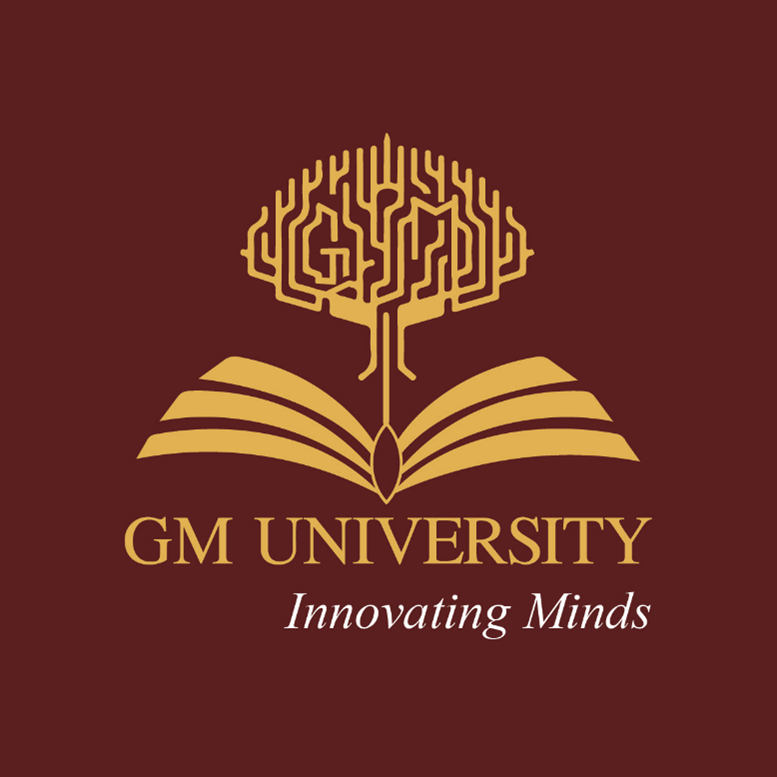- About Us
- Introduction
- Srishyla Educational Trust
- G M University
- GMU- Campus
- GMU Logo, Flag and Mascot
- GMU- Anthem
- Vision, Mission, Values, and Objectives
- Leadership
- Statutory Committees
- University Documents
- Organisation Structure
- University Best Practices
- Information and Communication Technology (ICT)
- Learning Management System (LMS)
- Human Resources (HR)
- Collaboration and Cooperation
- Campus life
- Events
- Proctorial System
- Student Placements
- IQAC
- Careers
- Contact Us
- Home About Us
- Introduction
- Srishyla Educational Trust
- G M University
- GMU- Campus
- GMU Logo, Flag and Mascot
- GMU- Anthem
- Vision, Mission, Values, and Objectives
- Leadership
- Statutory Committees
- University Documents
- Organisation Structure
- University Best Practices
- Information and Communication Technology (ICT)
- Learning Management System (LMS)
- Human Resources (HR)
- Collaboration and Cooperation
- Campus life
- Proctorial System
- Student Placements
- Contact Us
- Careers
- Programs
- Admissions
- Academics
- Research
- Skill Development
- Con, Innov.&Entr
- Library
- Grievances
Equipping University Students for Learning Through Facilitation Instead of Traditional Teaching
The transition from traditional teaching methods to facilitation in university education represents a paradigm shift towards creating more engaging, student-cantered learning environments. This approach emphasizes the role of teachers as facilitators rather than sole providers of knowledge, encouraging students to take an active role in their learning process. Here, we delve into the implications of this shift, exploring how it benefits student learning and what universities can do to prepare both students and teachers for this change.
The Shift from Teaching to Facilitation
Traditional Teaching Model: Historically, university education has been dominated by the lecture method, where professors impart knowledge and students passively receive information. This model places the teacher at the center of the learning experience, with students expected to absorb and reproduce knowledge.
Facilitation Model: In contrast, facilitation focuses on guiding students through their learning journey, enabling them to discover and construct knowledge for themselves. This learner-centered approach encourages critical thinking, problem-solving, and the application of knowledge in real-world contexts.
Benefits of Facilitation for Students
- Enhanced Engagement: Facilitation encourages active participation, making learning more engaging and meaningful. Students are more likely to retain information and concepts that they have actively explored and understood.
- Development of Critical Thinking: By encouraging students to question, analyze, and synthesize information, facilitation fosters deeper critical thinking skills, preparing students for complex problem-solving in their future careers.
- Improved Communication Skills: Group discussions, presentations, and collaborative projects are common in facilitated learning environments, helping students enhance their communication and teamwork skills.
- Personalized Learning: Facilitation allows for more personalized feedback and support, helping students progress at their own pace and according to their individual learning needs.
Preparing for the Transition
For Universities:
- Professional Development for Teachers: Universities should offer workshops and training sessions to help teachers develop facilitation skills, such as active listening, asking open-ended questions, and guiding group discussions.
- Curriculum Design: Curricula should be designed to support facilitated learning, incorporating project-based tasks, group work, and opportunities for students to pursue their interests within the subject matter.
- Infrastructure: Learning spaces should be adapted to facilitate group work and discussions, with flexible seating arrangements and access to technology that supports collaborative learning.
For Students:
- Orientation Programs: Introduce students to the expectations and methodologies of facilitated learning from the outset, helping them understand the importance of active participation and self-directed learning.
- Skill Development Workshops: Offer workshops to develop skills crucial for success in a facilitated learning environment, such as critical thinking, research methods, and effective communication.
- Support Systems: Provide mentoring and peer support systems to help students adapt to and thrive in a learning environment that demands more autonomy and self-direction.
Conclusion
Transitioning to a facilitation model in university education requires a cultural shift for both teachers and students. While challenging, this shift promises to create more dynamic, interactive, and effective learning environments that better prepare students for the complexities of the modern world. By investing in the necessary training, resources, and support systems, universities can successfully navigate this transition, ultimately enhancing the quality and relevance of higher education.

